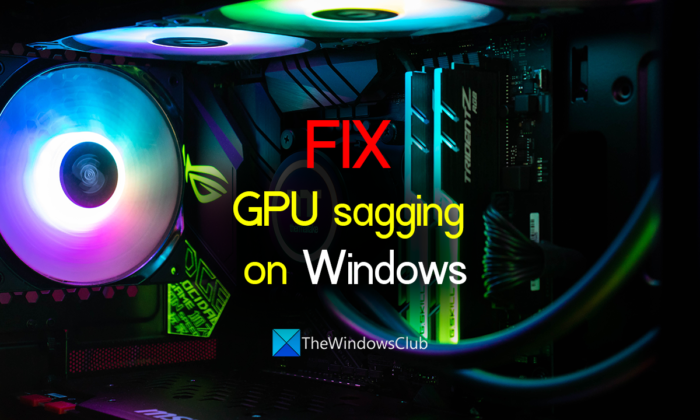Graphics Processing Units (GPUs) are important for tasks requiring heavy graphics like video editing, visual effects, or gaming. Keeping that in mind, companies develop GPUs with more capabilities than previous versions. The more the capability of the GPU is, the heavier it weighs. GPU sagging is real, and it needs to be taken care of. In this guide, we have some tips to address GPU Sagging on Windows PC.

Why is my GPU sagging?
GPU sagging happens when the graphics card is heavy for the case bracket holding it or the Printed Circuit Board (PCB) to support it. The slot and the GPU bend downward with the heavyweight. The dame of it depends on how fast you detect it and fix it. GPUs are usually made with tolerance to some amount of sag, like 11mm and below. If the sag is more than that, you need to take immediate action to fix it.
Is it OK if my GPU sags a little?
It is okay if the sag is below 11mm. GPU sag beyond that is trouble and may cause a lot of damage to your PC. It can damage GPU Cards, destroy slots, etc. You need to take care of the sagging at the beginning stage itself and reverse the damage that occurs with it. In this guide, we have solutions that can help you fix the GPU sagging on your Windows PC.
How to keep GPU from sagging on PC
If you notice GPU sagging on your Windows PC, you need to implement the following fixes to save GPU and your PC.
- Use PCI cables to lift GPU
- Use GPU Sag Bracket
- Fix the GPU vertically
- Fix a pencil or legos as support under GPU
- Use a string that can withstand heat and weight
Let’s get into the details of each one and fix the GPU sagging.
1] Use PCI cables to lift GPU
PCI cables are directly connected to the GPU. With the correct tension we create with them, we can lift the GPU and fix its sagging. The PCI cables if used correctly can lift the GPU to its correct position.
2] Use GPU Sag Bracket
If your GPU case supports an additional PCI bracket, it is better to add another GPU bracket to stop sagging and hold GPU in its position firmly. The additional bracket we install should be able to withstand the weight of GPU over time and lift it from sagging when we install it.
3] Fix the GPU vertically
Instead of installing GPU vertically which causes GPU to sag over time which damages the PC, if we don’t take care, you can install GPU vertically and eliminate the possibility of GPU sagging. Your cabinet should also have that space to let you install the GPU vertically.
Read: What is GPU Computing used for?
4] Fix a pencil or legos as support under GPU
You can also give some support to the bracket that is holding the GPU by taking away the weight from it by putting a pencil or legos under GPU to hold the weight. The weight then transfers from the holding bracket to the pencil or legos you put under the GPU. When you install something like this, you need to take care of the heat it generates and the material under it. If the thing you put under the GPU to support it cannot withstand heat, it will be another issue that may damage your PC.
Read: How to check the GPU Temperature in Windows 11/10
5] Use a string that can withstand heat and weight
Strings like fishing lines or nylon threads that can withstand the heat generated in the GPU and CPU can also help fix or prevent the GPU sagging issue. The string you choose needs to be tied to the backplate mount and top case to hold the GPU firmly, it will minimize the risk of sagging GPU. You need to use a string of dark colors if there are any LEDs inside the case.
Read: Things to know before buying an external GPU for your PC
These are the different ways using which you can fix GPU sagging.
How do I fix my sagging Graphics card?
There are different ways using which you can fix a sagging graphics card like installing an additional GPU bracket to hold it, using PCI cables to hold the GPU, or a string, or putting a thing like a pencil or legos under the GPU to withstand the heavyweight, or putting the GPU vertically.
Related read: Fix NVIDIA Container high Disk, GPU, Memory usage.
Leave a Reply